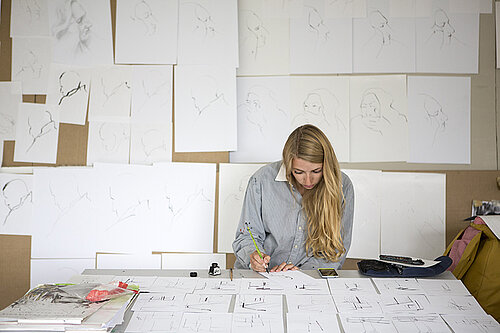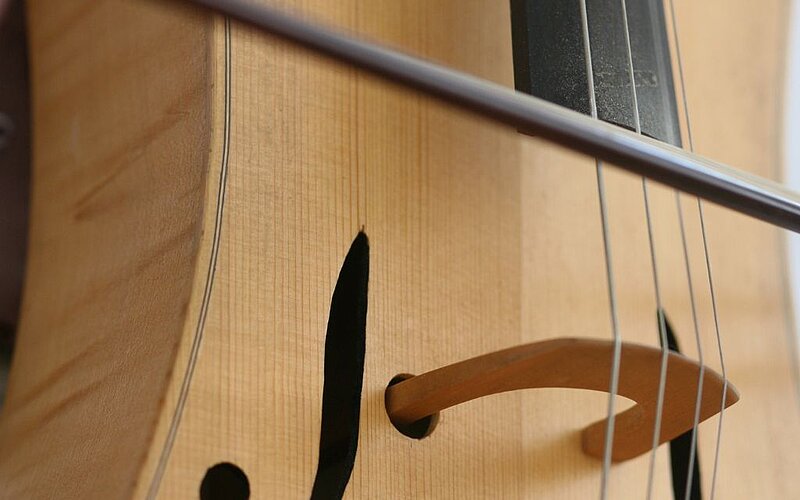
Music Therapy
Master of Arts / part-time (accredited)
‘All music is born in the heart of man.’
(Lü Buwei, Chinese philosopher, ca. 300 BC)
Many people recognise the healing effect and health-giving power of music – and they feel how music has a direct effect on their feelings and their bodies.
The part-time Master's programme in Music Therapy teaches an art-based and integrative approach based on anthroposophy, which makes an important contribution to a complementary treatment concept. The focus is on people and their individual development potential in health and illness.
You will acquire the theoretical and practical skills to stimulate healing processes and thus promote well-being and health in many areas of life and work. The Master's degree in Music Therapy enables you to work in numerous professional fields: in curative education and social therapy institutions, in therapeutic institutions, in clinics with a focus on psychiatry and psychosomatics, but also in paediatrics, oncology and all other somatic departments, in palliative medicine, in hospices and in the care of the elderly as well as in outpatient practice.
The newly accredited Master's degree programme in Music Therapy starts in March 2026.
Programme content
The focus of the Master's programme in Music Therapy (under accreditation) is the understanding of the effectiveness of music. This is gained from personal experience (phenomenological) as well as from research and brought into connection with human science. During the course of the programme you will practise playing the therapeutic instruments and learn about their practical application. Another focus of the programme is the intensive study of the individual elements of music: tones, intervals, harmonies, rhythms and tone systems. You will intensively analyse their qualities and effectiveness.
The Master's programme is divided into 16 modules and concludes with an academic Master's thesis. Contents from theory, practice and research are continuously combined. The cooperation with two anthroposophical teaching hospitals – Filderklinik, Filderstadt and Gemeinschaftskrankenhaus Havelhöhe, Berlin – is intended to ensure practical relevance throughout the entire programme. Courses for individual modules take place there. The content of the programme is divided into the following areas:
Theoretical foundations and methods
- Music therapy in the context of art, culture and science
- Introduction to scientific work and research in music therapy
- Professional knowledge, ethics of the profession and professional law
Basic medical knowledge and medical-psychological/psychotherapeutic expertise
- Anthropological foundations of health and illness
- Embryology, anatomy and physiology – Special pathology – Psychiatry and psychosomatics – Child and adolescent psychiatry – Developmental psychology and developmental disorders
- Basics of the human biography
- Psychotherapeutic treatment methods
Music therapy basics
- Therapy instruments – Singing voice – Eurythmy
- Diversity of the arts
- Methodology of phenomenology – Phenomenological studies
- Therapeutic improvisation (instrumental, vocal)
Music therapy practice
- Transformation of artistic into therapeutic means
- Music therapy diagnostics – treatment planning and implementation – documentation
- Active and receptive music therapy
- Theory and practice of group music therapy
- Fields of music therapy practice - Forms and methods of music therapy
- 2 five-week internships
Self-reflective activities
- Biography work
- Group music therapy as self-awareness
- Supervision and intervision
Career prospects
After completing the Master's degree programme in Music Therapy (accredited), you can work as a music therapist in a clinical context, e.g. in oncology, palliative medicine, psychosomatics, psychiatry, curative education, rehabilitation and outpatient therapeutic work, as well as in health prevention and in a social context.
Admission Requirements
Admission requirements
- Several years of previous musical training on an instrument and/or with singing.
- A completed Bachelor's degree in a social field such as music therapy, education, curative education, social work, psychology or similar or a completed music degree.
- Professional experience in a musical, social or educational field of work of at least one year after the first professionally qualifying university degree.
- A successfully passed entrance examination.
- International applicants should have sufficient written and spoken German language skills (e.g. TestDaF4/DSH2).
- In some cases, proof of relevant professional experience may be considered equivalent to a Bachelor's degree programme. Please seek individual advice on this.
Application Process
Application procedure
You will need the following documents for your application:
- Letter of motivation (PDF)
- CV incl. description of practical experience in music-making (instrument or voice, musical styles, number of years) (PDF)
- Certificates
- Proof of a work shadowing (12 hours)* with a music therapist in a clinic or curative education centre. (PDF)
- Passport photo (PDF, JPG)
- For foreign students: Proof of sufficient German language skills (through TestDaF 4, DSH or an equivalent certificate) (PDF)
*The work shadowing can take place during the 1st semester if necessary.
Please submit your application by e-mail or by post:
- By e-mail to Katja von den Benken: katja.vondenbenken@alanus.edu
- By post to:
Alanus University, Campus II
Department of Artistic Therapies and Therapy Science
Katja von den Benken
Villestrasse 3
53347 Alfter
Selection procedure
If your application is successful, we will invite you to an admissions interview with a musical audition at Alanus University. In addition to the admissions interview, you will play and/or sing three pieces of music of your own choice from different stylistic periods. You will then be given a short music listening test: Interval, rhythm, intonation (not applicable for applicants with a degree in music). We will let you know whether your application has been successful no later than one week after your interview.
Information & advice
Are you interested in the Master's degree programme in Music Therapy (under accreditation)?
Individual counselling:
Are you interested in the Master's degree programme in Music Therapy? We would be happy to advise you personally!
Simply get in touch with Katja von den Benken using our contact form, by phone on 02222 9321-1809 or by email at ma.musiktherapie@alanus.edu.
The next info & counselling appointments in 2025 (online via Zoom) with Monica Bissegger and/or Odulf Damen:
Friday, 27 June / 5-6.30 p.m.
Friday, 22 August / 6.30 - 8 p.m.
Friday, 03 October / 5 - 6.30 p.m.
Work shadowing day in class:
Friday, 22 August / 9 a.m. - 12.30 p.m. (with registration)
Application deadline: 15 January 2026
Registration:
You can simply register for the information dates using our form.
You will then receive the access link for the online event.
Dates for entrance examinations
Dates for the next entrance exams (45 min. per appointment) Campus II – Villestraße, with Monica Bissegger, Odulf Damen:
Friday, 11 July 2025, from 9-12.30 a.m.
Tuesday, 9 September 2025 from 3 - 6 p.m.
Thursday, 9 October 2025 from 9 a.m. - 12 p.m.
Thursday, 4 December 2025 from 9 a.m. - 12 p.m.
Thursday, 5 February 2026 from 9 a.m. - 12 p.m.
Module overview
Module overview Master's programme in Music Therapy (under accreditation)
| Module | Title | ECTS | Semester |
|---|---|---|---|
| M1 | Music Therapy in the Context of Art, Culture, and Science | 6 | 1 |
| Music and Art History | 3 | 1 | |
| Music Therapy in Therapeutic and Scientific Contexts | 2 | 1 | |
| The Seven Liberal Arts | 1 | 1 | |
| M2 | Academic Work and Research in Music Therapy | 6 | 2–3 |
| Introduction to Academic Work and Various Research Methods | 3 | 2 | |
| Research in Music Therapy | 3 | 3 | |
| M3 | Basic Medical and Psychological Knowledge | 7 | 1 |
| Embryology, Anatomy, and Physiology | 2 | 1 | |
| Anthropological Foundations of Health and Illness | 2 | 1 | |
| Fundamentals of Human Biography | 3 | 1 | |
| M4 | Specialized Medical and Psychological Knowledge I | 6 | 2 |
| Specific Pathology | 3 | 2 | |
| Developmental Psychology and Developmental Disorders | 3 | 2 | |
| M5 | Specialized Medical and Psychological/Psychotherapeutic Knowledge II | 5 | 3 |
| Psychiatry and Psychosomatics | 2 | 3 | |
| Child and Adolescent Psychiatry | 1 | 3 | |
| Psychotherapeutic Treatment Methods | 2 | 3 | |
| M6 | Foundations of Music Therapy I | 7 | 1 |
| Methodology of Phenomenology | 1 | 1 | |
| Therapeutic Instruments | 3 | 1 | |
| Singing Voice | 2 | 1 | |
| Eurythmy | 1 | 1 | |
| M7 | Foundations of Music Therapy II | 5 | 2 |
| Methodology of Phenomenology / Phenomenological Studies | 1 | 2 | |
| Therapeutic Instruments | 3 | 2 | |
| Music Workshop | 1 | 2 | |
| M8 | Foundations of Music Therapy III | 6 | 3 |
| Therapeutic Instruments | 3 | 3 | |
| Therapeutic Improvisation (instrumental, vocal) | 1 | 3 | |
| Eurythmy | 1 | 3 | |
| Singing Voice | 1 | 3 | |
| M9 | Music Therapy Practice I | 6 | 2 |
| Forms and Methodology of Music Therapy (active, receptive) | 4 | 2 | |
| Fields of Practice in Music Therapy | 2 | 2 | |
| M10 | Music Therapy Practice II | 6 | 3 |
| Diagnostic Approaches in Music Therapy | 2 | 3 | |
| Fields of Practice in Music Therapy | 3 | 3 | |
| Project Work | 1 | 3 | |
| M11 | Music Therapy Practice III | 8 | 4 |
| Transforming Artistic into Therapeutic Means | 2 | 4 | |
| Psychotherapeutic Aspects of Music Therapy / Counseling Skills | 1 | 4 | |
| Fields of Practice in Music Therapy | 2 | 4 | |
| Treatment Planning and Implementation | 2 | 4 | |
| Documentation | 1 | 4 | |
| M12 | Music Therapy Practice IV | 7 | 5 |
| Theory and Practice of Group Music Therapy | 2 | 5 | |
| Fields of Practice in Music Therapy | 2 | 5 | |
| Methods of Music Therapy | 2 | 5 | |
| Ethics and Professional Law | 1 | 5 | |
| M13 | Self-Reflective Competencies | 7 | 4–6 |
| Supervision | 3 | 4–5 | |
| Improvisation / Group Music Therapy as Self-Experience | 2 | 4 | |
| Professional Identity as a Music Therapist | 2 | 6 | |
| M14 | Studium Generale (General Studies) | 6 | 5–6 |
| Elective Topics, e.g.: | |||
| Biography – Writing, Reading and Celebrating Life | |||
| Anthroposophy, Psychology, and Therapy: The Relationship Between Soul and Body | |||
| Epistemological Foundations of Anthroposophical Spiritual Science | |||
| M15 | Music Therapy Clinical Internship (1 x 5 weeks) | 8 | 4 |
| Music Therapy Clinical Internship (1 x 5 weeks) | 8 | 5 | |
| M16 | Master's Thesis | 16 | 5–6 |
Total Credits for the entire program: 120 ECTS
Dates
The Master’s Degree Programme in Music Therapy begins in March 2026 and lasts for three years or six semesters. Each semester consists of five extended weekends (four days each, Thursday to Sunday) and one block week (seven days, Saturday to Friday).
Some modules take place in two cooperating clinics: the Filderklinik near Stuttgart and the Havelhöhe Community Hospital in Berlin.
Master Music Therapy – Semester 4
| No. | Month | Weekend/Block Week | Date |
|---|---|---|---|
| 19 | March 2026 | Block Week | 14–20 March 2026 |
| 20 | April 2026 | Weekend | 9–12 April 2026 |
| 21 | May 2026 | Weekend | 7–10 May 2026 |
| 22 | June 2026 | Weekend | 11–14 June 2026 |
| 23 | July 2026 | Weekend | 9–12 July 2026 |
| 24 | August 2026 | Weekend | 20–23 August 2026 |
Master Music Therapy – Semester 5
| No. | Month | Weekend/Block Week | Date |
|---|---|---|---|
| 25 | September 2026 | Block Week | 12–18 September 2026 |
| 26 | October 2026 | Weekend | 15–18 October 2026 |
| 27 | November 2026 | Weekend | 12–15 November 2026 |
| 28 | December 2026 | Weekend | 10–13 December 2026 |
| 29 | January 2027 | Weekend | 14–17 January 2027 |
| 30 | February 2027 | Weekend | 11–14 February 2027 |
Master Music Therapy – Semester 6
| No. | Month | Weekend/Block Week | Date |
|---|---|---|---|
| 31 | March 2027 | Block Week | 13–19 March 2027 |
| 32 | April 2027 | Weekend | 15–18 April 2027 |
| 33 | May 2027 | Weekend | 20–23 May 2027 |
| 34 | June 2027 | Weekend | 17–20 June 2027 |
| 35 | July 2027 | Weekend | 8–11 July 2027 |
| 36 | August 2027 | Weekend | 19–22 August 2027 |
Current Certificate Course in Music Therapy – Semester 1
| No. | Month | Weekend/Block Week | Date |
|---|---|---|---|
| 1 | September 2024 | Block Week | 7–13 September 2024 |
| 2 | October 2024 | Weekend | 10–13 October 2024 |
| 3 | November 2024 | Weekend | 7–10 November 2024 |
| 4 | December 2024 | Weekend | 5–8 December 2024 |
| 5 | January 2025 | Weekend | 16–19 January 2025 |
| 6 | February 2025 | Weekend | 13–16 February 2025 |
Certificate Course in Music Therapy – Semester 2
| No. | Month | Weekend/Block Week | Date |
|---|---|---|---|
| 7 | March 2025 | Block Week | 15–21 March 2025 |
| 8 | April 2025 | Weekend | 10–13 April 2025 |
| 9 | May 2025 | Weekend | 15–18 May 2025 |
| 10 | June 2025 | Weekend | 12–15 June 2025 |
| 11 | July 2025 | Weekend | 10–13 July 2025 |
| 12 | August 2025 | Weekend | 21–24 August 2025 |
Certificate Course in Music Therapy – Semester 3
| No. | Month | Weekend/Block Week | Date |
|---|---|---|---|
| 13 | September 2025 | Block Week | 6–12 September 2025 |
| 14 | October 2025 | Weekend | 9–12 October 2025 |
| 15 | November 2025 | Weekend | 6–9 November 2025 |
| 16 | December 2025 | Weekend | 4–7 December 2025 |
| 17 | January 2026 | Weekend | 15–18 January 2026 |
| 18 | February 2026 | Weekend | 5–8 February 2026 |
Lecturers
Head of the Institute for Music Therapy
Monica Bissegger, music therapist, anthroposophic art therapist, BVAKT music department, mentor / BVAKT teaching therapist, primary and secondary school teacher
Head of music therapy certificate course
Odulf Damen, music therapy lecturer, former head of the BA programme in music therapy at Leiden University of Applied Sciences, employee of the Lektoraat AG research centre, Leiden University of Applied Sciences, FVB professional association
Lecturers
- Monica Bissegger
Music therapist BVAKT e. V., music therapist at the Filderklinik Filderstadt, primary and secondary school teacher
- Odulf Damen
Music therapist (registered FVB), musician, former head of the bachelor's programme in music therapy at the Hogeschool Leiden, NL
- Viola Heckel, M.A.
Music therapist BVAKT e.V., vocal therapist, recorder player, Klinik Arlesheim, Arlesheim, CH
- Dr. Susan Kobus
Music therapist, University Medicine Essen, lecturer, Faculty of Medicine, University of Duisburg-Essen, board member of the Scientific Society of Artistic Therapies
- Stephan Kühne
Music therapist BVAKT e.V., Havelhöhe Community Hospital, Berlin
- Martin Maier-Hangler
M.Sc., music therapist, vocal therapist, singer, qualified health and nursing professional, Ita Wegmann Therapeutikum Linz, independent practice Vienna


